Perfect cameras for safari and general travel photography.
Are you going to spend your vacation in Africa and need a camera for safari photography? If you want to immerse yourself in the world of wild flora and fauna and save your memories in the form of colorful and atmospheric photos, you should invest in decent gear.
Looking for safari photography equipment most people choose between DLSR and compact cameras. The former allow taking pictures that will look professional and ravishing. The second option seems perfect because of the small weight and dimensions.
This guide covers 9 amazing cameras that belong to both categories. Thus, if you like traveling light, pay attention to compact camera models. In case you don’t mind carrying a bit heavier camera in order to marvel at detailed and colorful photos once you return home, opt for DLRs.
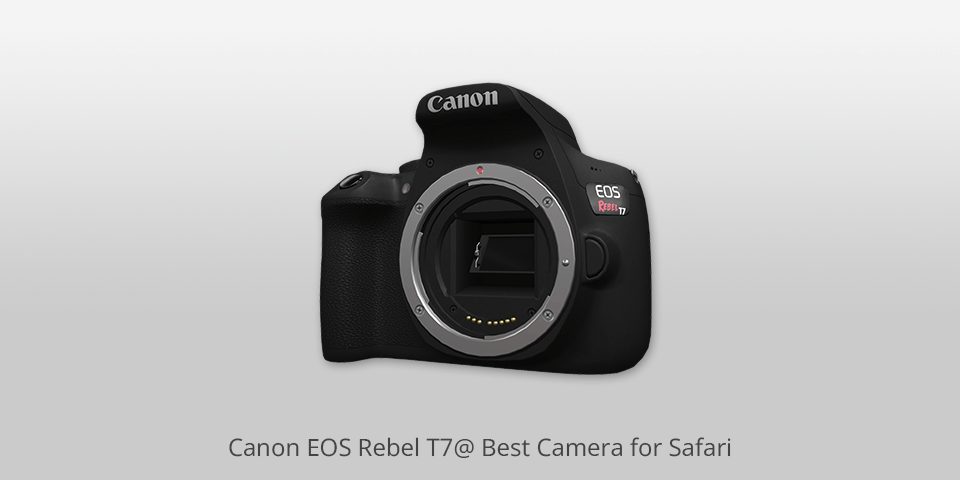
Type: Digital Camera | Sensor size: 3" | Resolution: 24.1 MP | Lens: 18-55mm f/3.5-5.6 | Viewfinder: Optical (pentamirror) | Screen type: LCD | Maximum continuous shooting speed: 3fps
⊕ Low noise level in photos
⊕ Close-to-life colors and superb sharpness
⊕ Fitted with a popup flash unit
⊕ Ergonomic design
⊖ Low speed in burst mode
Canon EOS Rebel T7 is a perfect camera for safari and bird photography that will be especially useful for beginners as it has intuitive features and supports a range of shooting modes with pre-adjusted settings. It is equipped with the DIGIC 4+ image processor, which accounts for its speedy performance. With it, you can shoot at the speed of 3 fps.
The camera boasts a 9-point AF system, which allows you to use it for snapping great photos of nature. Thanks to the impressive ISO range of 100-6400, this model enables you to snap pro-level pics of animals in poor light conditions without using a flash. Another selling point of this model is that it supports recording full HD 1080p videos at 30 fps.
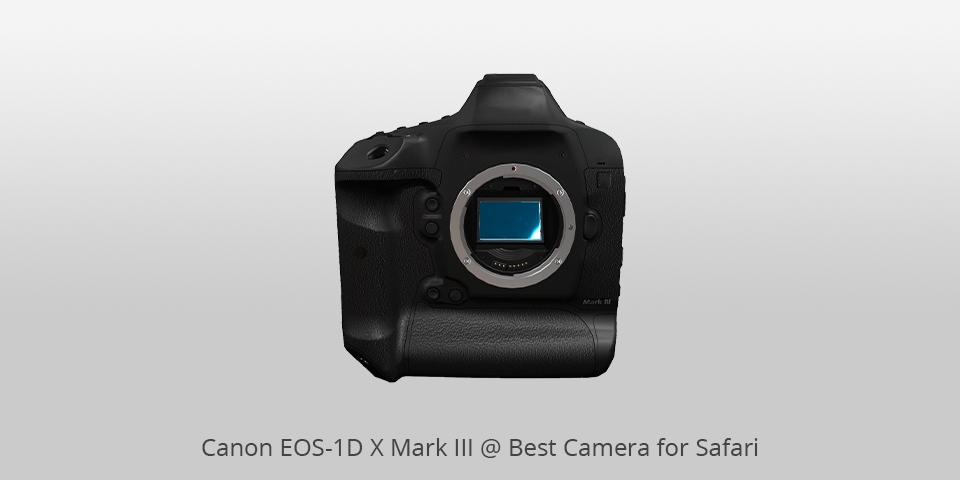
Type: DSLR Camera | Sensor size: 1/2.3" | Resolution: 20.1MP | Lens: Canon EF | Viewfinder: Pentaprism | Screen type: LCD | Maximum continuous shooting speed: 20fps
⊕ Latest Smart Controller
⊕ Rugger, long-lasting case
⊕ Advanced AF
⊕ Almost limitless buffer
⊖ Lacks animal AF
⊖ No tilting LCD screen
The most flattering words about this camera are said by National Geographic photographers and that’s the most desirable characteristic any model can brag about. The Mark III is a truly powerful camera and the flagship DLSR produced by Canon.
It is made of durable materials and is bound to serve you for many years. The device is very fast, allowing shooters to take RAW photos at 20 frames per second.
Thanks to the rear LCD display, you can instantly check your pictures even under the hot African sun. This camera for safari is also favored by many users because of a responsive touch screen meant to quick focus adjustments and handling basic parameters.
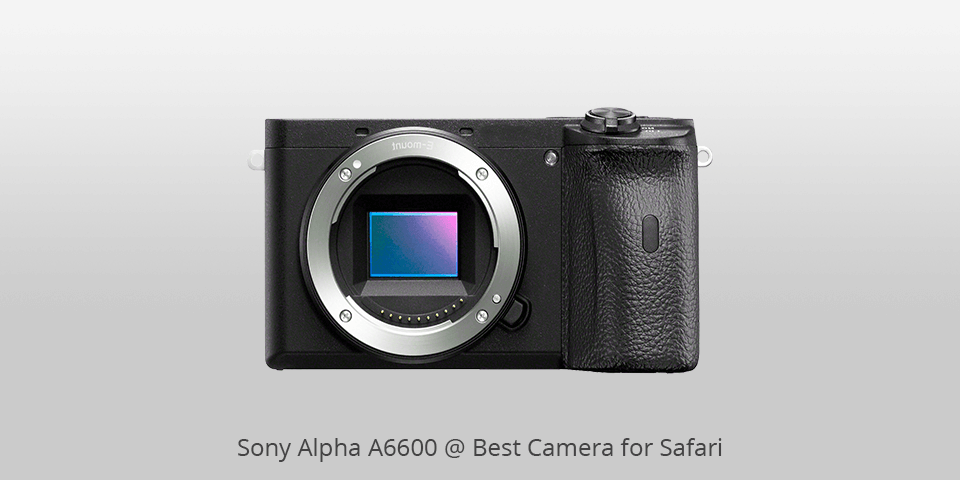
Type: Mirrorless Camera | Sensor size: 1.0" | Resolution: 24MP | Lens: Sony E | Viewfinder: EVF| Screen type: LCD | Maximum continuous shooting speed: 11fps
⊕ Real-time tracking mechanism
⊕ Works long without charging
⊕ Firm and convenient handgrip
⊕ Embedded EVF
⊖ Built-in flash issues
The Sony a6600 belongs to the group of mirrorless devices with interchangeable lenses. It has a 24MP APS-C sensor and boasts a real-time tracking system. The latter is helpful at instant jumping from subject tracking, to face and eye detection.
Not only can Sony a6600 be considered as the best camera for Safari, but it is also equipped with must-have features for vlogging and taking selfies. For example, you can take advantage of 180 tilting touchscreen and mic & headphone ports.
Using this model, you can record your adventures in 4K/30p. When AF and auto-exposure are enabled, it allows shooting at 11fps. The uninterrupted performance is possible due to the capacious Z-type FZ1000 battery, which makes this camera even a more appealing option to avid travelers.
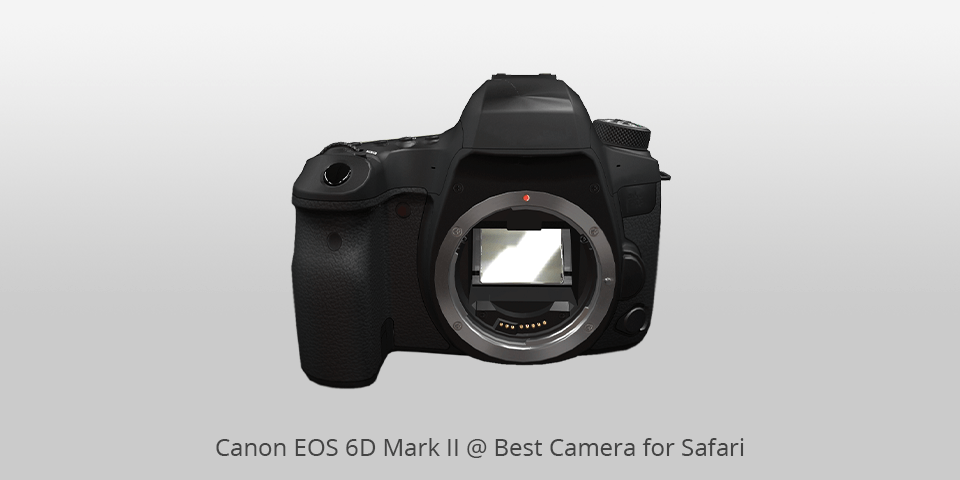
Type: SLR Camera Body | Sensor size: 1/2.3" | Resolution: 26.2MP | Lens: Canon EF | Viewfinder: Optical | Screen type: LCD | Maximum continuous shooting speed: fps
⊕ Awesome Live View focusing
⊕ Convenient grip
⊕ Enhanced touchscreen control
⊕ Adjustable tilting angle
⊕ Rich connectivity
⊖ Poor dynamic range
The initial EOS 6D camera showed amazing performance in low light conditions and enjoyed great support among photographers interesting in the nighttime shooting. The new model preserved the strong points of its predecessor, and improved capabilities with higher ISOs and better resolution.
A higher frame rate is another advancement aimed at action fans. Using Canon EOS 6D Mark II, you can shoot at 6.5fps, which is almost 50% faster than 4.5fps offered by the “older brother”.
This African safari cam also stands out with its set of connectivity options – Wi-Fi, NFC and Bluetooth. If you feel like transferring your photos from a camera to another device right after they have been taken, you should enable Bluetooth and keep it active while you are documenting the things happening around.
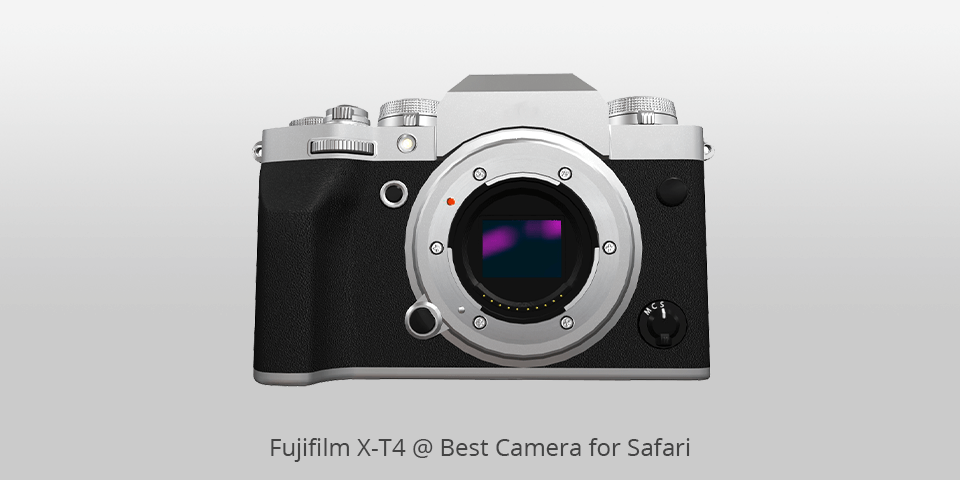
Type: Mirrorless Camera | Sensor size: 1/2.3" | Resolution: 26.1MP | Lens: X-T4 + X-series | Viewfinder: Electronic | Screen type: OLED | Maximum continuous shooting speed: 240fps
⊕ Well-built
⊕ Top-level APS-C sensor
⊕ Low battery consumption
⊕ Intuitive menu
⊖ Disappointing EVF in the scarce light
⊖ Comes without a headphone port
The Fujifilm X-T4 can become the best camera for safari and wildlife if you have enough money to splurge on. Though the price is far above average, it seems to be fully justified by the variety of features this camera has. In addition to the stylish appearance, the X-T4 impressed with unprecedented photo and video quality.
Thanks to the 5-axis integrated image stabilizer (IBIS), you can use up to 6.5 stops of image stabilization in order to keep high sharpness and clarity even if you are too excited to keep tabs on these parameters on your own. Besides, the camera shoots 4K at 60fps and is capable of ultra-fast burst shooting.
Type: Digital Camera Body | Sensor size: 1/2.3" | Resolution: 45.7MP | Lens: 24-120mm f/4 | Viewfinder: Electronic | Screen type: LCD | Maximum continuous shooting speed: 9fps
⊕ Big and bright viewfinder
⊕ 19.4MP DX crop mode
⊕ Capacious battery
⊖ High price
⊖ SnapBridge calls for improvement
This bridge camera for wildlife is a controversial member of the overview with its max shooting speed of 7fps, which can be considered disappointing by many. Besides, it is capable of taking just 52 RAWs before the buffers overruns.
Anyway, we decided to include it on this list of the best cameras for safari because of other handy features putting it on par with the rest of devices. This is a full-frame model with amazing AF that is powered by a 153-point Multi-CAM system.
Besides, it allows for f/5.6 aperture, which is suitable for tracking animals during your safari trip. The D850 comes in a watertight housing, which makes it suitable for shooting even in heavy rain.
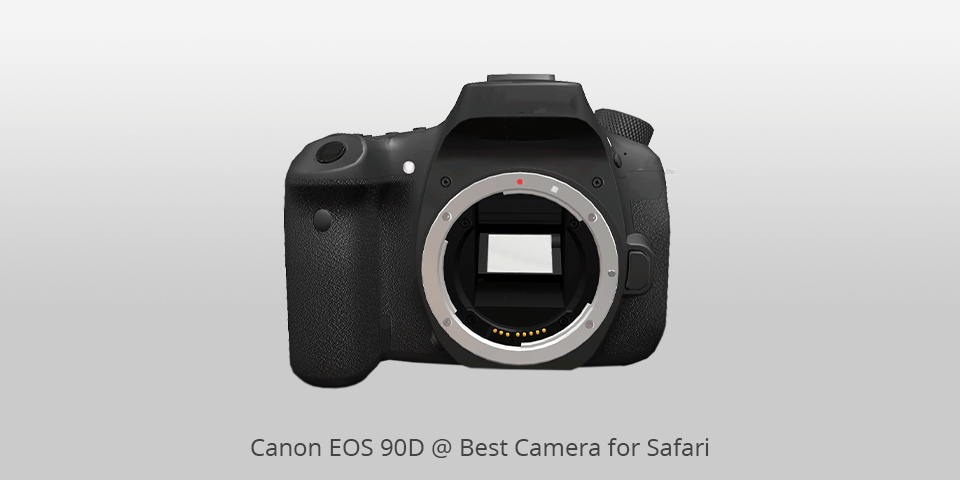
Type: DSLR Camera | Sensor size: 1/1.8" | Resolution: 32.5MP | Lens: F/8 | Viewfinder: Optical | Screen type: LCD | Maximum continuous shooting speed: 10fps
⊕ Great 35.2MP sensor
⊕ 10fps shooting with iTR tracking
⊕ Tilting LCD
⊕ Protected from water and dirt
⊖ Stiff rear dial
Canon tried to please those photographers, whose initial demand is high footage quality and created the EOS 90D. This camera allows shooting 4K with clear details similar to those at 1080p.
You can enjoy noiseless HDMI up to 4K, HDR at 1080p, 4K time-lapses generated onboard and cool movie effects. Following the tendency set by the brand, this device is also equipped with fantastic video AF.
The Canon EOS 90D can become the best camera to take on safari for people, who want a mixture of features presented by 80D and the EOS 77D. It has a great high-res sensor with outstanding RAW quality, and makes it possible to record crisp 4K footage without going broke.
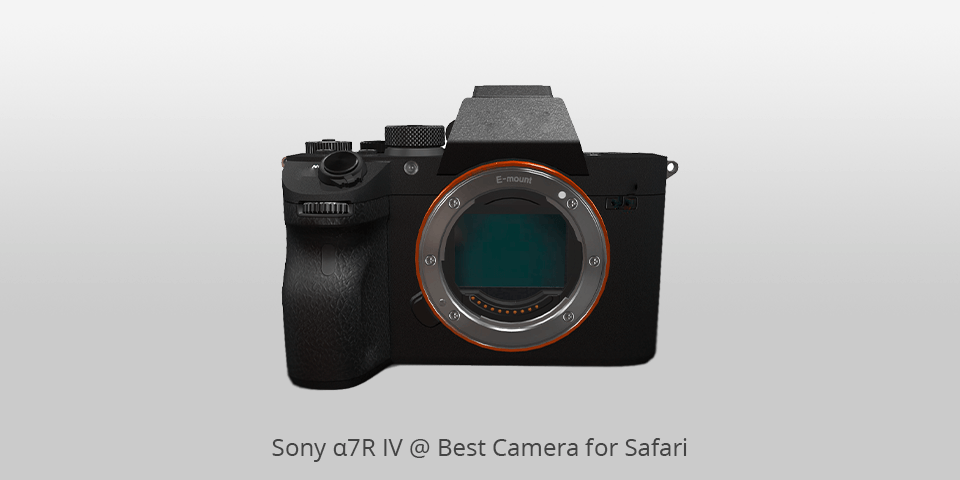
Type: Full-frame Mirrorless | Sensor size: 1/3” | Resolution: 26.2MP | Lens: none | Viewfinder: Electronic | Screen type: LCD | Maximum continuous shooting speed: 10fps
⊕ Ergonomic, simple-to-use camera
⊕ Agile AF
⊕ Sharp, bright viewfinder
⊕ Stunning 4K
⊖ Problems with AWB and focusing
This is a worthy high-res full-frame mirrorless camera, with a BSI-CMOS sensor. It is good enough not only for safari but also for more pro-level tasks and allows taking 60.2MP pictures. In addition to remarkable photo quality, this device also offers 15 stops of dynamic range.
Thanks to the ISO varying from 100 to 32000, you can use this camera for safari to capture the nature and animals even in dim light. The quality of the photos will pleasantly surprise you.
As for the AF, 567 points make the Sony α7R IV unexcelled since other high-resolution cameras have no more than 160 autofocus points. This is also relevant for DSLRs, mirrorless and medium format products.
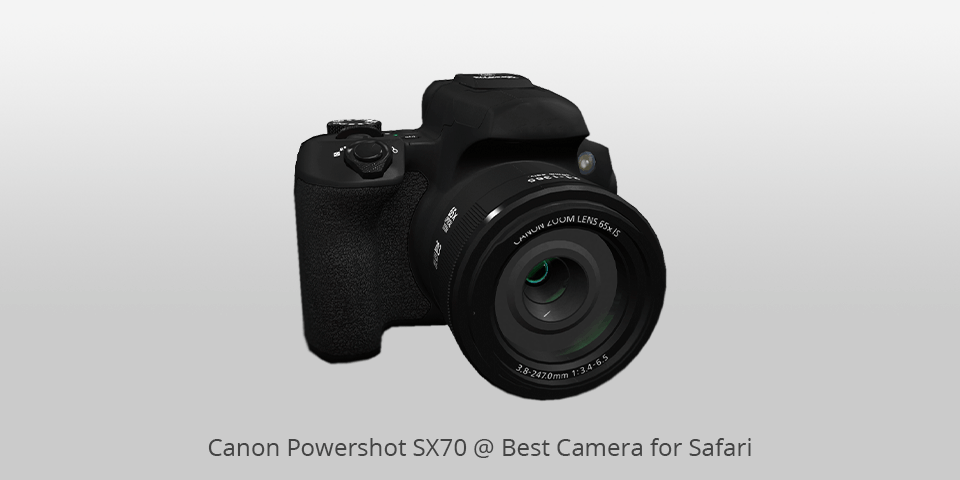
Type: Digital Camera | Sensor size: 1/2.3" | Resolution: 20.3MP | Lens: f/3.4-6.5 | Viewfinder: Electronic | Screen type: LCD | Maximum continuous shooting speed: 10fps
⊕ 65x zoom
⊕ LCD with adjustable tilt angles
⊕ Amazing EVF
⊕ 10fps continuous shooting
⊖ Not the best in poor light
If you decided on a compact device, you may like this superzoom miniature camera with a large 65x optical zoom. It received a new 20.1MP ultra-sensitive CMOS sensor which provides outstanding photo quality in conjunction with the company’s latest mighty DIGIC 8 processor.
This African safari cam can reveal its full potential being paired with a lens equivalent to 21-1365mm in 35mm terms. The aperture maxes at f/3.4/ – f/6.5. The device visually resembles its predecessor, while the most praiseworthy improvements include the latest DIGIC 8 engine, which entailed the appearance of up to 5 stops of correction.
| Image | Name | Features | |
|---|---|---|---|
 |
Canon EOS Rebel T7
Our Choice |
CHECK PRICE → | |
 |
Canon EOS-1D X Mark III
Budget |
CHECK PRICE → | |
 |
Sony Alpha A6600
Professional |
CHECK PRICE → |
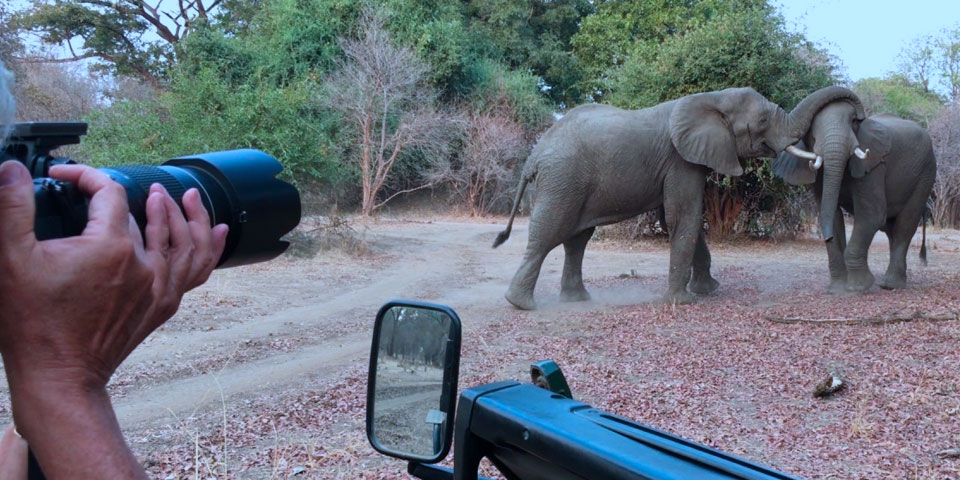
Even if you have checked the forecast a hundred times before going to a safari trip, the weather can be very changeable and unpredictable, so it is better to invest in a camera protected from moisture and accidental drops. Thus, you can fully enjoy the picturesque landscapes and wildlife around you without constantly worrying about your gear protection.
If you plan to visit Africa, you probably know about weight limits. This generally refers to taking bushcraft and means that your suitcase can’t be heavier than 33 pounds. Having packed the most necessary things, you’ll notice that there isn’t much room for a camera, especially if you promised your friends and relatives to bring souvenirs.
Thus, you’d better opt for a lightweight, compact camera for safari. Besides, such a device won’t put extra load on your neck since a regular safari lasts a day or two and you need to carry your camera with you all the time.
The best camera for wildlife photography is the one with a bigger fps number. This way, you can keep track of fast-paced animals and capture them even during fast movements. Your photos will be detailed and sharp.
Regular users claim values from 4fps to 6fps are sufficient enough for this type of shooting, but if you are a professional, you need a camera with a higher fps value.
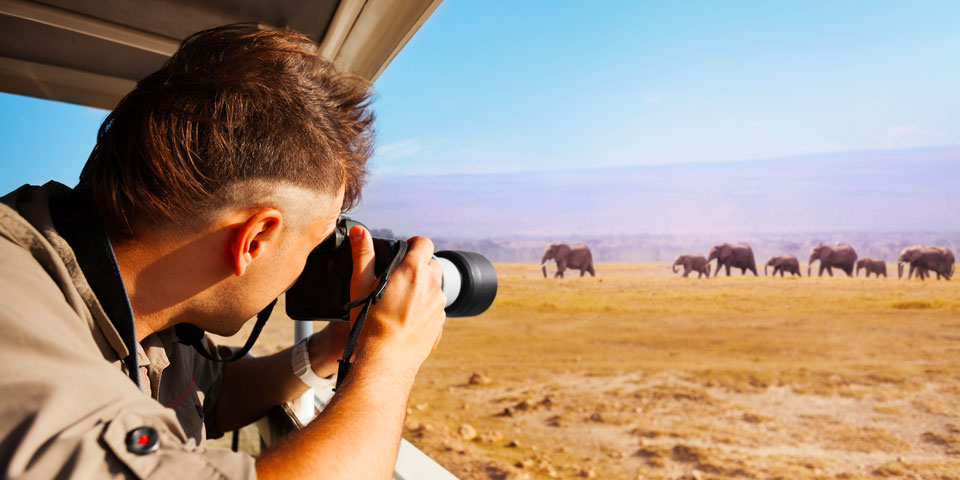
The best camera for safari crammed with lots of cool features can be absolutely useless if you know little about how to use it to your advantage. If you are a common traveler dreaming of immortalizing your trip to Africa, you can rely on an entry-level device, mastering which is a breeze. In case you decide to purchase a more advanced option, take time to learn its features.
If you are an experienced traveler and know a thing or two about photography, we recommend checking the Canon EOS 7D or Canon EOS 6D lineups. These models are designed to work in different weather conditions and deliver great image quality. They are also suitable if you enjoy capturing your everyday life.
We believe that this is an ideal focal length for this type of entertainment. You can use a 400mm lens as the main body, and also bring a 70-200mm for shooting in low light.
Modern smartphones are equipped with 10x zoom cameras. The entry-level DSLRs offer a 20x zoom. However, this all becomes irrelevant when Nikon’s COOLPIX series with its mind-blowing 83x-166x zoom comes to the stage.
If your safari trip is a one-time adventure, it is more reasonable to rent a lens at place. Thus, you don’t need to carry additional safari photography equipment and can save some money.

 Rating
Rating